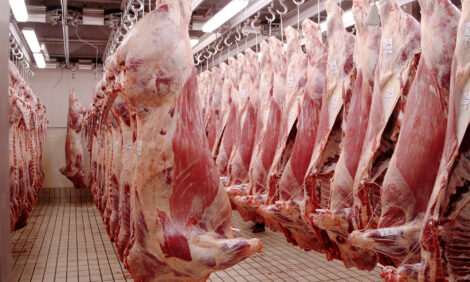



Chinese Melamine Import And The Issue Of Food Labelling
US - The recent melamine problems in wheat gluten and rice protein imported from China brings to center stage the issue of unrestrained free trade as it relates to food safety. Although these products were intended for animal feed and not human food, the issues are similar, says R-Calf president Max Thornsberry.Trade with countries that have different production standards and quality control measurements highlights the importance of country-of-origin labeling (COOL) of food sold in the United States. The need for COOL is once again driven home by the Food and Drug Administration’s (FDA) discovery that the tainted Chinese feed additives were labeled as wheat gluten and rice protein, but actually were ordinary wheat flour illegally mixed with melamine and related banned compounds in an effort to boost the apparent protein content.
Media reports also indicated melamine scrap, a cheaper form of the melamine chemical, was used to mimic higher-protein animal feeds. Of particular concern to U.S. consumers are reports that the FDA inspects only a fraction of imported foods and does not have an effective program to verify the veracity of foreign regulatory systems.
Equally disconcerting are reports that a cough syrup additive purchased from China was contaminated with diethelyene glycol, a sweet, extremely toxic chemical used to manufacture antifreeze. In Panama and Haiti, deaths from consuming this tainted cough and fever medication are estimated to be in the thousands.
In the U.S., most consumers trust our government – before entering into a trade agreement – to confirm that foreign regulatory measures are adequate. Yet free trade actually is about purchasing products cheaper than they can be produced here in the United States. Obviously, the FDA and the U.S. Department of Agriculture (USDA) cannot inspect every ton of imported product, typically testing only for crude protein, fat, and fiber – not illegal contaminants.
While recently touring Central America, I identified numerous products utilized in livestock production that have been outlawed here in the U.S. for decades such as human antibiotics forbidden for use in livestock here, banned anabolic steroids designed to increase libido in bulls and to increase muscle mass in show cattle, even DDT.
Boring? Precisely the issue.
Consumers, trusting livestock producers, importers, and government enforcement agencies have all told me this issue of contaminated meat, poultry, food, and feed is a boring subject, and the typical U.S. consumer is not interested. Tell that to the owners of beloved family pets that have died or will require life-long medical management after consumption of melamine-contaminated food, which was produced with imported ingredients in the most progressive and well-regulated country in the world – the United States.
USDA officials and opponents of COOL have stated on numerous occasions that COOL is not a food-safety issue. Given the use of the melamine-tainted additive in feed for poultry and hogs destined for eventual human consumption, savvy consumers think otherwise. COOL remains a food-safety issue as long as the FDA and USDA – agencies charged with protecting U.S. consumers against tainted food and feed – continue to advise us that imported products are safe, despite facts to the contrary. One cannot assume that the production standards of other countries are identical to those practiced in the United States. Even Canadian livestock producers are allowed to use certain antibiotics that are prohibited in the United States. Our two countries share a common heritage, but are not the same in regulatory matters.
The U.S. is the only country in the Western Hemisphere that does not have mandatory COOL for food, and in particular for meat. Canada has COOL, but Canadian lobbyists are pressuring our Congress to make certain it is not implemented in the United States. A good rule of thumb is to follow the money, and this time it’s at the expense of contaminated food and feed.
U.S. consumers have the right to express their desire to buy U.S.-produced food and feed. Mandatory COOL has been the law of the land since 2002, but multinational corporations have consistently forced delays of implementation.
I hope no great catastrophe must occur to the U.S. food system before consumers demand their right to make informed choices for their family’s health. While regulatory agencies in the U.S. monitor our domestic food and feed supplies, U.S. standards do not adequately impact our foreign trade partners.
TheCattleSite News Desk


